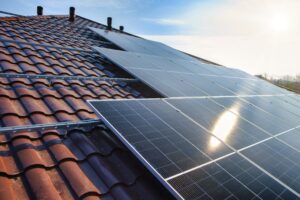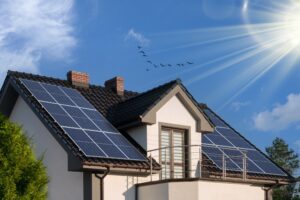Are you considering installing cavity wall insulation on your property but unsure whether the investment is worth it in the long term? This article is designed to inform you on the longevity of cavity wall insulation.
With the United Kingdom’s spiralling energy bills, households are trying to find ways to reduce costs. Cavity wall insulation has many fantastic benefits, from reducing your energy bills and minimising your carbon footprint to limiting the risks of draughts in your home.
Throughout this article we will outline the pros and cons of each cavity wall insulation material, ways you can check whether you have cavity walls, and how long the insulation should last, as well as the cost of insulation and the removal process.
Types Of Cavity Wall Insulation Materials
As the technology and understanding around cavity wall insulation continue to grow, insulation manufacturers have been able to create new insulation materials to fulfil different needs. Each insulation type has its pros and cons and caters for different requirements.
Polyurethane Foam
Also known as PUR, polyurethane foam is one of the oldest forms of cavity wall insulation. As the UK continues to move towards greater insulation to improve household efficiency levels, most new-build homes may already feature this type of insulation.
Minimising heat loss, PUR provides an air barrier for your home and makes the insulation material less likely to produce mould. However, this insulation type can lead to damp problems as PUR tends to shrink over time. If this were to happen, cold patches could develop within your wall insulation which can lead to water damage.
Polystyrene Beads
Also known as EPS, expanded polystyrene bead insulation is installed within cavity walls using a bonding agent which makes it easy to install. Due to the beaded nature of this insulation material, EPS is less likely to clump together and is also one of the more water-resistant insulation methods available on the market.
When installed incorrectly, however, EPS beads can escape your cavity wall which will hinder its efficiency levels. Additionally, this could also leave your household susceptible to damp patches as escapee beads will minimise the insulation’s water-resistant capabilities.
Mineral Wool
The oldest insulation method on the market is mineral wool, which is well-known for being cheap to produce, environmentally friendly, and easy to install. However, this insulation material is not water resistant and tends to clump together, which can lead to structural damage to your property, if clumping occurs around any wall ties.
Additionally, mineral wool can also be installed between two insulation boards to provide internal wall insulation.
Cavity Batts
Building upon the weaknesses of mineral wool, insulation developers created cavity batts. Essentially, cavity batts are large slabs of mineral wool which have been coated with water-resistant film. While this allows cavity batts to be cheap to manufacture, each to install, and are also water and fire-resistant, it is not the most efficient insulation method on the market.
In addition, cavity batts can only be added to properties during the building process, and cannot be added to already finished houses.
How Do I Know If I Have Cavity Walls?
Not every house in the UK is built using cavity walls. Depending on when your property was built, your house will either feature cavity walls or solid walls, older houses typically will feature solid walls. If your house was built with solid walls, then cavity wall insulation will not be suitable for your home, however, there are alternative solid wall insulation methods available on the market.
Ways To Check Whether You Have Cavity Walls
- Check your EPC rating – Most properties in the UK will have an Energy Performance Certificate (EPC) rating, which provides your property with an energy efficiency rating. If your property already has a high rating, you may already have cavity wall insulation.
- Is your house built after the 1920s – If your home was built before the 1920s when building regulations changed, then your property more than likely has solid walls rather than cavity walls.
- Look at your brick pattern – Properties that feature an even brick pattern where all the bricks have been laid lengthways more than likely have cavity walls. Whereas walls that have an uneven pattern and display bricks laid with shorter sides are a sign of solid walls.
- Measure your wall – If you cannot see the brick pattern on your property, perhaps you have external wall insulation installed, and then you can measure your walls to check for cavity walls. Properties that feature a wall thickness greater than 260mm have probably been built with cavity walls.
How Long Does Cavity Wall Insulation Last?
No matter what material is used to insulate cavity walls, each option comes with the same predicted lifespan. When installed correctly, cavity wall insulation is expected to last the entire lifespan of your property. Additionally, all insulation methods can come with a 25-year guarantee courtesy of the Cavity Insulation Guarantee Agency, or similar programmes.
When you work with Effective Home, our insulation is covered by the HIES and QualityMark Protection programmes, offering the same 25-year guarantee.
Cavity Wall Insulation Removal
If you have old insulation or wish to replace home insulation methods already installed in your property then you’ll be pleased to hear that cavity wall insulation can easily be removed. To remove existing insulation, specialists will blow compressed air into your wall cavity, while a vacuum will suck the insulation out.
If you have cavity wall insulation installed, but you are unhappy with the results, the chances are there could have been an issue during the installation process. Due to the difficult location of cavity walls, mistakes are easy to make. However, insulation specialists simply need to use thermal imaging or borescope inspection devices to ensure that insulation is working effectively. If not, they can easily fix it.
At Effective Home, our expert insulation installers take every care to ensure any insulation installed is done so effectively to give you the best results.
How Much Does Cavity Wall Insulation Cost?
One of the biggest concerns potential customers have when it comes to purchasing cavity wall insulation is how much it will set them back. The final cost will depend on a variety of factors, including the insulation material used, installation costs, how much insulation you require, and the type of property you live in. However, the Energy Saving Trust has produced figures to provide a general guideline of the average cost of cavity wall insulation in England, Scotland, and Wales:
| Average cost of cavity wall insulation | |
| Property type | Average cost in England, Scotland and Wales |
| Flat | £1000 |
| Bungalow | £2100 |
| Mid Terrace | £1500 |
| Semi-Detached | £2700 |
| Detached | £4600 |
While cavity wall insulation requires a hefty initial investment, the potential yearly energy bill savings you may experience more than makeup for it.
How Long Does Cavity Wall Insulation Last Summary
If you have decided that installing cavity wall insulation is the perfect option to improve your household’s energy efficiency rating, then you have a wide variety of materials to choose from, including:
- Polyurethane foam
- Polystyrene beads
- Mineral wool
- Cavity batts
No matter what insulating materials you choose to have installed in your cavity walls, each method comes with a predicted lifespan that covers the lifespan of your property. Additionally, all cavity wall insulation also comes with a 25-year guarantee with Effective Home.
If you are ready to take the next step towards installing cavity wall insulation on your property, then why not get in touch with Effective Home? Our insulation experts can answer any questions you may have regarding cavity wall insulation.



